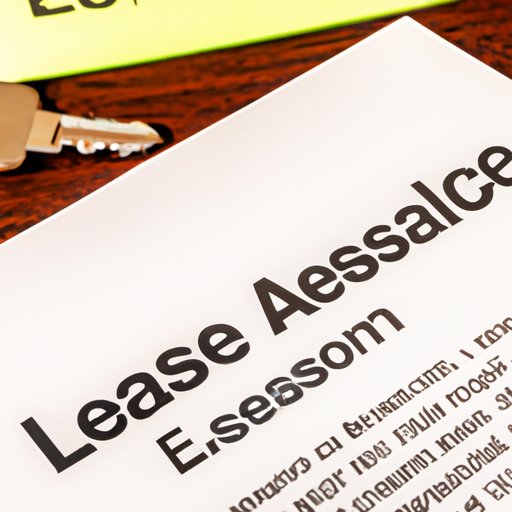Introduction
Breaking a lease can be a difficult and daunting process, but sometimes circumstances arise that demand it. Whether you need to move for a new job, experience financial hardship, or have an emergency requiring relocation, it’s crucial to know your options and responsibilities when it comes to terminating a lease. In this guide, we’ll offer tips and advice for breaking a lease as smoothly and painlessly as possible.
Your Guide to Breaking a Lease: What You Need to Know
First and foremost, it’s important to understand what your lease agreement says regarding early termination. Most agreements require renters to pay a fee or penalty for breaking a lease early, and others stipulate that renters must continue to pay until a replacement tenant is found. Some landlords may be willing to negotiate, however, so it’s always worth having a conversation about your options.
It’s also important to consider the possible consequences of breaking a lease, such as losing your security deposit or being sued for unpaid rent. To minimize these risks, always be honest with your landlord about your situation and try to provide a replacement tenant or subletter if possible. This will demonstrate to your landlord that you are taking responsibility for your actions and trying to make the situation as easy as possible for them.
5 Legal Reasons You Can Break Your Lease Without Penalty
While most lease agreements require some kind of fee or penalty for early termination, there are certain legal reasons you can use to break a lease without being penalized. These reasons typically include military deployment, serious health issues, or a landlord violating your privacy or safety rights. It’s important to check your state and federal laws, as well as your lease agreement, to make sure you are protected in these situations.
If you do need to use one of these legal reasons to break your lease, make sure you have documentation to back up your claim, such as a doctor’s note or military orders. This will help protect you in case of any disputes or legal action.
Tips for Breaking a Lease with Minimal Damage to Your Wallet
If you need to break your lease but want to avoid financial damage, there are a few strategies you can try. First, look for a replacement tenant or subletter to take over your lease. This can be a win-win for both you and your landlord, as it ensures that the property remains occupied and that rent continues to be paid.
Another option is to negotiate with your landlord about payment plans or other alternatives to paying the full penalty fee. You may be able to offer your security deposit as partial payment, for example, or agree to forfeit it entirely in exchange for early termination.
Going the Extra Mile: Best Practices for a Smooth Lease Break
To make the process of breaking your lease as smooth as possible, there are several proactive steps you can take. One important step is to give your landlord ample notice of your intentions, ideally in writing. This allows them to begin looking for a new tenant and minimizes the risk of any disputes or misunderstandings down the line.
You should also make sure to keep the unit clean and in good condition during your remaining time in the rental, as this will make it easier for your landlord to show the property to potential replacements. Finally, be sure to return all keys and other property to your landlord on time, and make arrangements for the return of your security deposit.
What to Avoid When Breaking a Lease: Common Mistakes Renters Make
When it comes to breaking a lease, there are several common mistakes that renters make that can have costly or damaging consequences. One of the most common mistakes is failing to inform your landlord of your intentions, which can lead to legal disputes or even eviction proceedings. Always be upfront and communicate with your landlord as clearly and comprehensively as possible.
Another common mistake is breaking the lease without understanding the terms of the agreement. Be sure to thoroughly read and understand your lease before signing, and reach out to your landlord or a legal professional if you have any questions or concerns.
Conclusion
Breaking a lease can be a stressful and overwhelming experience, but it’s important to be proactive and informed in order to minimize the damage and ensure a smooth transition. By following the tips and advice in this guide, you’ll be better equipped to handle the challenges of breaking your lease and finding your next home.
